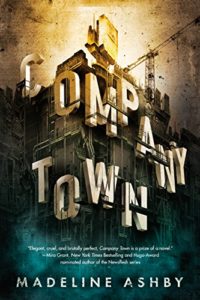Each year, I like to put books by authors I haven’t read on my reading list. It keeps my reading fresh, keeps me from falling into a rut, and best of all, I usually discover an author or two each year that I want to get more familiar with.
One of the new authors on my reading list last year was Madeline Ashby. Her books Company Town and vN appeared repeatedly in my Amazon recommendations and through my other book recommendation sources. Since her writing falls squarely into my near-term science fiction interest, adding one of her books to my list was an easy decision. For my first selection, I chose to read Company Town.
Company Town is an interesting view of the near future where human augmentation has become pervasive. It’s so pervasive that it is the rare individual who does not have an electronic, connected implant of some sort. As in any environment, being rare brings opportunity. It makes the main character, named Hwa, a special commodity. When the declining oil town she lives in is purchased by a wealthy, powerful family, she is sought out to protect the young successor to the company’s fortune. The job entangles Hwa in a web of mystery and intrigue as she is left trying to figure out who is trying to kill the successor to upend the family patriarch’s succession plan, and why they want to do it.
I liked the story, for the most part. There were just a couple of things I struggled with. The first was the book’s environment and setting. It wasn’t described in enough detail where I could fully immerse myself in it. I understood that it was made up of various interconnected high rises built over a water setting, but I had a hard time envisioning the overall layout. My other struggle was with the plot. It felt a little disjointed and rushed toward the end. It made it hard for me to keep up with the pace of the plot and how the various parts of the story were coming together. I also wish the technology would have been explored just a little further. Ashby introduces some very interesting concepts around augmentation and its societal impacts, but similar to the environment, didn’t go deep enough for my liking.
Overall, I found the book interesting. It was interesting enough that I’d like to read another of Ashby’s books in the future. The most likely candidate will be vN. It’s not on my 2020 reading list, but I expect it will make an appearance within the next 2-3 years.

